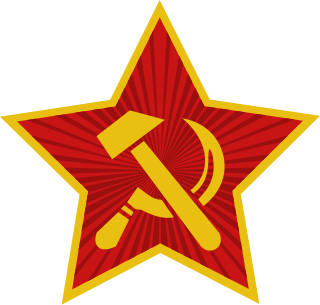
The Communist Party of Germany was a major far-left political party in the Weimar Republic during the interwar period, an underground resistance movement in Nazi Germany, and a minor party in West Germany during the postwar period until it was banned by the Federal Constitutional Court in 1956.

The German Communist Party is a communist party in Germany. The DKP supports left positions and was an observer member of the European Left. At the end of February 2016 it left the European party.

The Homeland, previously known as the National Democratic Party of Germany, is a far-right Neo-Nazi and ultranationalist political party in Germany.

Udo Voigt is a German politician and former Member of the European Parliament (MEP) for the far-right and Neo-Nazi party National Democratic Party of Germany (NPD) between 2014 and 2019. He was a member of the European Parliament Committee on Civil Liberties, Justice and Home Affairs. He served as leader of NPD from 1996 to 2011. By profession, he is a former captain in the German Air Force and has a master's degree in political science from LMU. Voigt has in recent years become a strong supporter of Vladimir Putin and has said that Germany should have "a chancellor like Putin."

The Communist Party of Germany is an anti-revisionist Marxist-Leninist communist party in Germany. It is one of several parties which claim the KPD name and/or legacy. It was founded in Berlin in 1990. The party is also commonly referred to by the name KPD-Ost to differentiate it from other parties with the same name, most prominently the historical Communist Party of Germany.

Christian Worch is a prominent German neo-Nazi activist and chairman of the far-right political party Die Rechte.

The Communist Party of Germany/Marxists–Leninists was a clandestine communist party active in West Germany and East Germany during the Cold War. It was founded in 1968 by former Communist Party of Germany (KPD) official Ernst Aust, who subsequently became the party's chairman. An anti-revisionist party, the KPD/ML upheld the legacy of Soviet premier Joseph Stalin and supported China under Mao Zedong and later Albania under Enver Hoxha after the Sino-Albanian split. At its peak in the mid-1970s, the party claimed a membership of around 800.
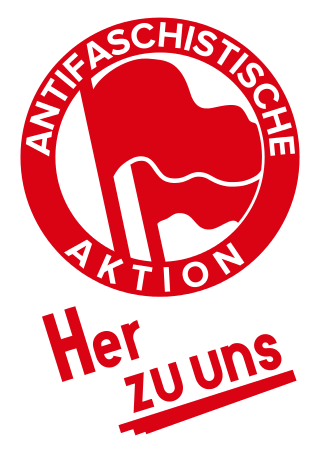
Antifaschistische Aktion was a militant anti-fascist organisation in the Weimar Republic started by members of the Communist Party of Germany (KPD) that existed from 1932 to 1933. It was primarily active as a KPD campaign during the July 1932 German federal election and the November 1932 German federal election and was described by the KPD as a "red united front under the leadership of the only anti-fascist party, the KPD."
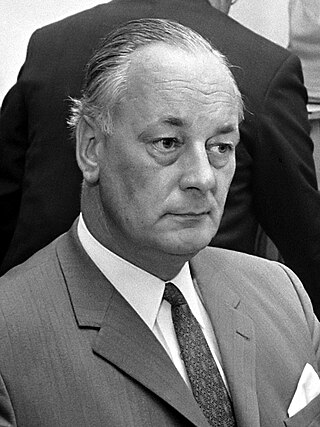
Adolf von Thadden was a German far-right politician. Born into a leading Pomeranian landowning family, he was the half-brother of Elisabeth von Thadden, a prominent critic of the Nazis who was executed by the Nazi government in September 1944.

The Roter Frontkämpferbund, usually called the Rotfrontkämpferbund (RFB), was a far-left paramilitary organization affiliated with the Communist Party of Germany (KPD) during the Weimar Republic. It was officially a non-partisan and legally registered association. The organisation was banned by the governing Social Democrats in 1929.
The German Alternative was a minor neo-nazi group set up in Germany by Michael Kühnen in 1989.
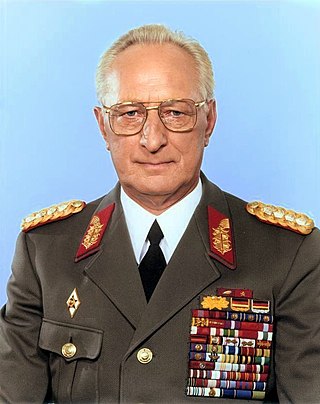
Heinz Keßler was a German communist politician and military officer in East Germany.
The far-right in Germany slowly reorganised itself after the fall of Nazi Germany and the dissolution of the Nazi Party in 1945. Denazification was carried out in Germany from 1945 to 1949 by the Allied forces of World War II, with an attempt of eliminating Nazism from the country. However, various far-right parties emerged in the post-war period, with varying success. Most parties only lasted a few years before either dissolving or being banned, and explicitly far-right parties have never gained seats in the Bundestag post-WWII.
Racism in German history is inextricably linked to the Herero and Namaqua genocide in colonial times. Racism reached its peak during the Nazi regime which eventually led to a program of systematic state-sponsored murder known as The Holocaust. According to reports by the European Commission, milder forms of racism are still present in parts of German society. Currently the racism has been mainly directed towards Asian and African countries by both the state and through the citizens which includes being impolite and trying to interfere in internal matters of African countries by the diplomats.

The Association of Persecutees of the Nazi Regime – Federation of Antifascists (VVN-BdA) is a German political confederation founded in 1947 and based in Berlin. The VVN-BdA, formerly the VVN, emerged from victims' associations in Germany founded by political opponents to Nazism after the Second World War and the end of the Nazi rule in Germany.
Hermann Weber was a German historian and political scientist. He has been described as "the man who knew everything about the German Democratic Republic".

Querfront is a German term originating in Weimar politics and referring to the cooperation between the far-right and far-left, or nationalist and socialist ideologies, as well as the combination of their positions. It is primarily understood as a strategy to unite forces in an effort to gain power. The term was first, and most prominently, used in the Weimar Republic, where it referred to the cooperation between conservative revolutionaries and the far-left.

The Workers' Party of Germany short-form: PdAD, was a minor political party in Germany. It saw its mission in overcoming the left-right political divide via the Querfront strategy.
The Social People's Party short-form: SVP, was a short-lived minor militant Neo-Nazi party in Germany. The SVP split from the Rostock section of the National Democratic Party of Germany after the NPD started to reorientate itself in a more National Bolshevik direction, which around half of the Rostock sector disapproved of. Both this ideological disagreement, as well as a power struggle between the later founding members of the SVP and the newly elected leadership of the NPD, following its defeat in the 1998 Mecklenburg-Vorpommern state election, culminated in the SVP splitting off.
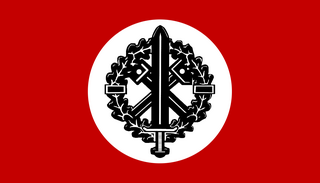
The Combat League of German Socialists short-form: KDS, was a German Querfront and neo-Nazi organization founded on the 1 May 1999 and dissolved in 2008.















